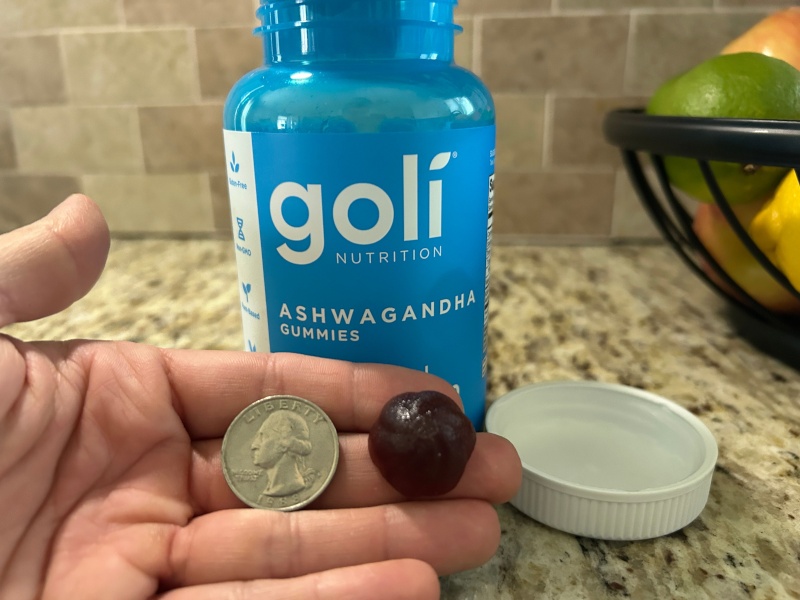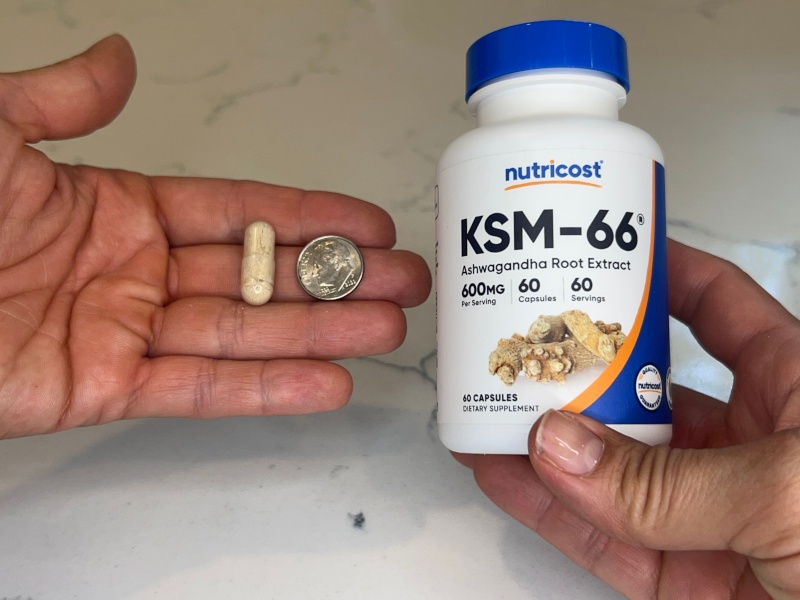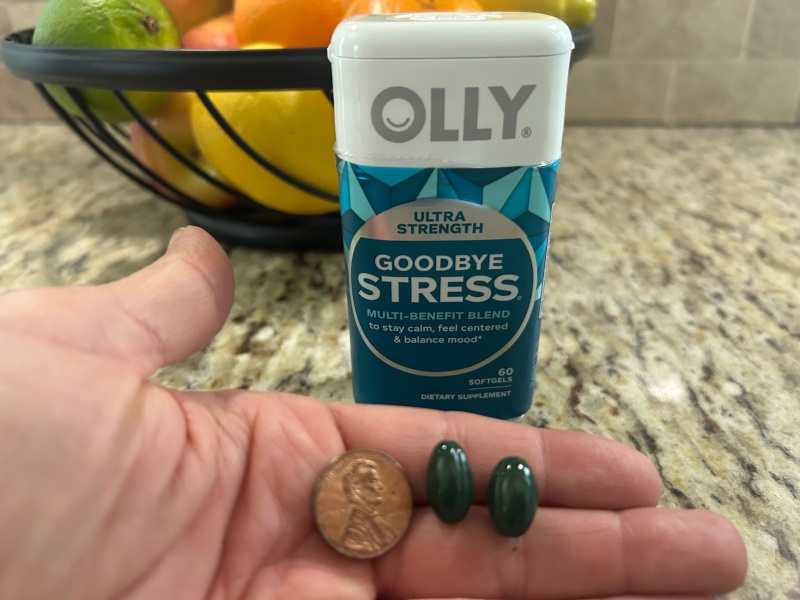Sleep aid supplements can be a powerful tool for those who struggle to fall asleep at night. Of course, nothing beats sticking to a regular sleep schedule and following good sleep hygiene practices, but if you’ve already tried that, supplements like ashwagandha can be a handy tool in your quest for better sleep.
While ashwagandha is a powerful herb with various health benefits, it’s not as common as other natural sleep remedies like melatonin or magnesium. This root has been used in Ayurvedic medicine for thousands of years, and it’s best known for its anxiety-relieving properties, which may indirectly help promote better sleep by reducing levels of cortisol (1), the stress hormone.
If you’ve never tried it before, we’ve got you covered with our top picks for different preferences and goals.
Our team has tested hundreds of supplements, including sleep aids, magnesium, melatonin, ashwagandha, and more, carefully examining factors such as formulation, taste and smell, potency, side effects, and more.
We also consulted with Sydney Lappe, R.D., who provided her expert insight on ashwagandha supplements and the formulas we tested. She was able to share expert guidance on the types of ashwagandha, the best doses, how to use it to promote sleep and overall wellness, and more.
Finally, remember that you should always speak with your doctor before using any sort of dietary supplement.
Best Ashwagandha Supplements
- Transparent Labs KSM-66 Ashwagandha – Best Ashwagandha Supplement Overall
- Goli Ashwagandha Gummies – Best Ashwagandha Gummy
- Nutricost KSM-66 Ashwagandha – Best Budget Ashwagandha Supplement
- Gaia Ashwagandha Root – Best Vegan Ashwagandha Supplement
- OLLY Ultra-Strength Goodbye Stress – Best Ashwagandha Supplement for Stress
Disclaimer: Please note that the content in this article is meant for informational purposes only and should not be construed as medical advice or serve as a substitute for seeing a medical professional regarding any sleep problems you may have. Please see your doctor regarding any urgent medical issues.
What I Looked for in the Best Ashwagandha Supplements
When it comes to ashwagandha supplements, not all are created equal. Because ashwagandha is a plant, there are different forms and extractions commonly used in dietary supplements, and a variety of doses. I’ve tried plenty of ashwagandha formulas over the years. While some have worked quite well, some haven’t caused any noticeable effects, so I included only the best formulations that our testers used and enjoyed.
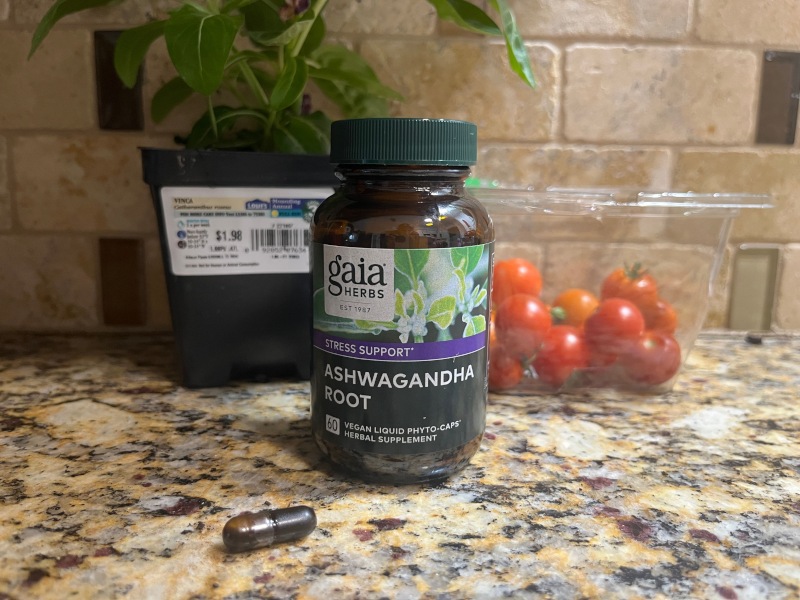
With so many options, picking the right supplement can be difficult. That’s why we had our team test a wide spectrum of ashwagandha supplements, using our review methodology to rate each product and choose the best of the best.
Here are some of the most important factors I considered when choosing the products to include in this guide:
- Formulation: Ashwagandha comes in several different forms, and depending on the type, you may see different dosing across formulations. I carefully considered each product’s ingredient list and consulted with Sydney Lappe, R.D., to ensure we were choosing formulas that were both safe and effective.
- Third-party testing: Dietary supplements aren’t strictly regulated by the Food and Drug Administration (FDA), so while the FDA has supplement guidelines in place, manufacturers aren’t required to prove they meet these guidelines before selling a product. Unfortunately, it’s not uncommon to come across supplements with inaccurate labels or containing contaminated or banned ingredients. Third-party testing looks at both purity and label accuracy, verifying a supplement contains what it should.
- Taste: Ashwagandha is a shrub that often has a potent earthy flavor and smell, so we made sure to look for supplements that weren’t too off-putting. Of course, with a strong ashwagandha supplement, a little bit of smell and taste will be unavoidable, but we only chose supplements that our testers would continue to take.
- Side effects: While none of the supplements we tested caused any unpleasant side effects for our testers, your results may vary. Still, we’d never recommend anything we didn’t use and enjoy, so each product on our list was completely side-effect-free after repeated testing.
When I was choosing the products to include on this list, I also considered the price per serving, customer service, average customer reviews and scores, and more. If you’re on a tight budget, many of these products also offer subscription discounts when you order directly from the company or through certain third-party vendors, like Amazon.
I also considered the potency, which refers to the type of ashwagandha used, as well as the dosing. Supplements with a high potency will generally have a stronger effect than those with lower doses.
In addition to third-party testing, I tried to include supplements that are manufactured in GMP facilities, which stands for “Good Manufacturing Processes.” GMP facilities are typically designed to minimize health and safety risks while meeting regulatory requirements.
Transparent Labs KSM-66 Ashwagandha – Best Ashwagandha Supplement Overall
Transparent Labs KSM-66 Ashwagandha
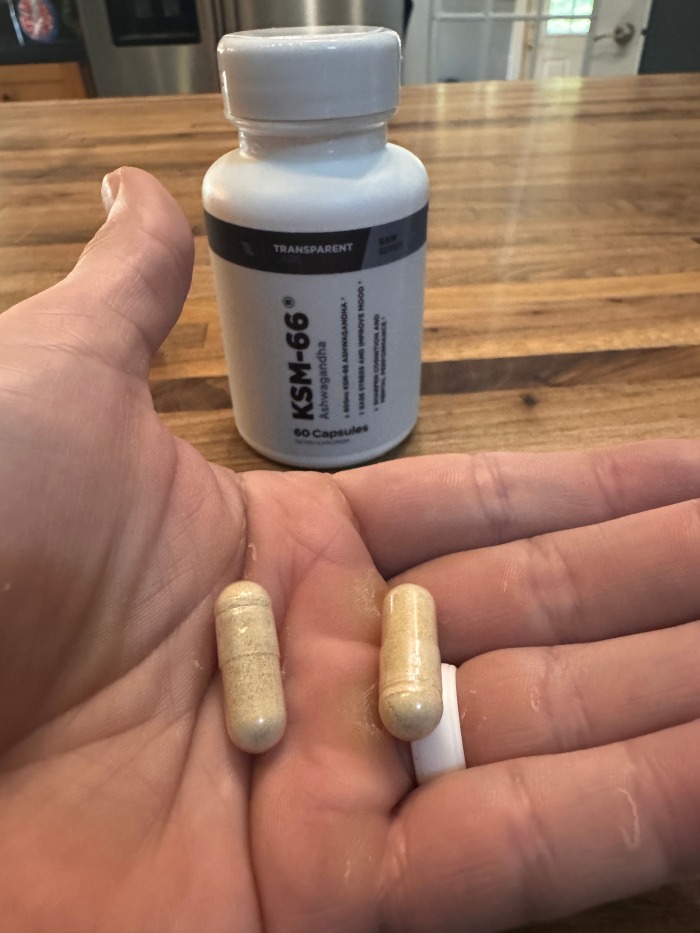
A high-quality, clinically studied KSM-66 ashwagandha supplement designed to support stress reduction and cognitive function.
Goli Ashwagandha Gummies – Best Ashwagandha Gummy
Goli Ashwagandha Gummies
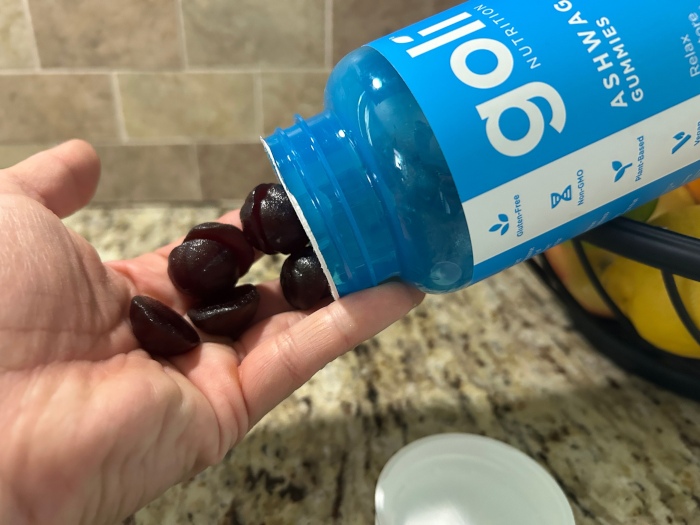
Tasty mixed berry gummies infused with KSM-66 ashwagandha to help manage stress and support relaxation.
Nutricost KSM-66 Ashwagandha – Best Budget Ashwagandha Supplement
Nutricost KSM-66 Ashwagandha
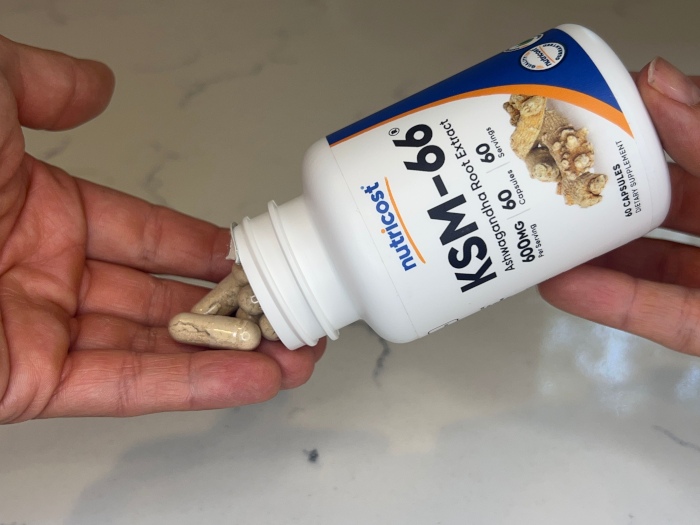
Affordable KSM-66 ashwagandha capsules with added BioPerine for improved absorption.
Gaia Ashwagandha Root – Best Vegan Ashwagandha Supplement
Gaia Ashwagandha Root
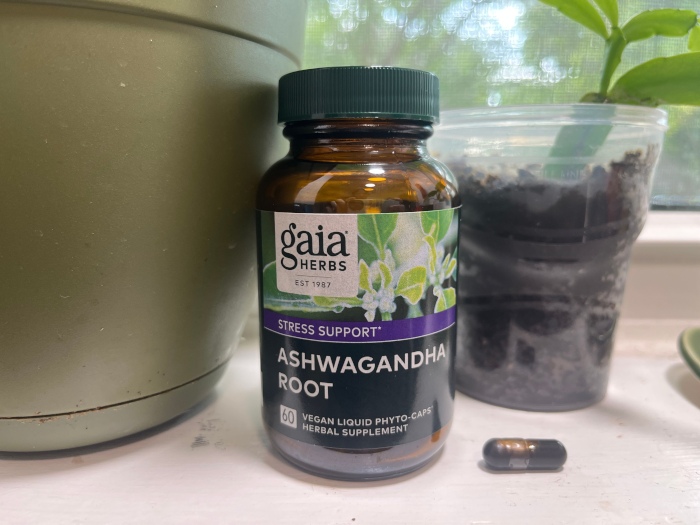
Organic ashwagandha root capsules designed to support stress response and overall well-being.
OLLY Ultra-Strength Goodbye Stress – Best Ashwagandha Supplement for Stress
OLLY Ultra-Strength Goodbye Stress
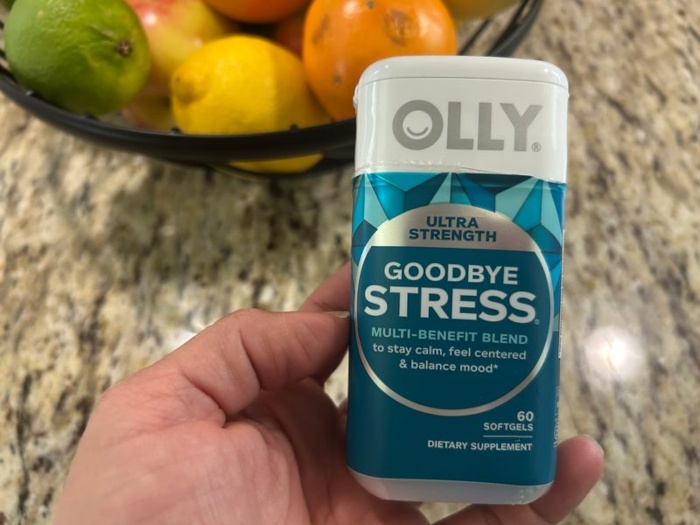
A blend of ashwagandha, GABA, L-theanine, and lemon balm in softgel form to help manage stress and promote relaxation.
Other Ashwagandha Supplements We Considered
While we narrowed this list down to our top five choices, we tested plenty more that we enjoyed but didn’t quite make the cut.
Nutricost Ashwagandha Gummies
Similar to Olly, Nutricost offers a gummy version of its ashwagandha supplement for those who don’t like pills. While we like the formulation, our tester, Kate Meier, found the taste to be quite unpleasant, especially compared to Goli.
Kate said, “Oof. I usually LOVE gummies, but this one reminds me of the Dimetapp cough syrup my mom would make me take when I was younger. These have sugar! Why aren’t they sweeter? I wouldn’t say the taste is horrible, but I’ve had better-tasting ashwagandha gummies.”
These aren’t a bad choice, especially as flavor is subjective and you may love the taste, but we simply preferred the Olly gummies.
Double Wood Ashwagandha Capsules
Double Wood Ashwagandha is a high-quality product manufactured in a GMP facility. The website provides third-party testing results, which we love to see. However, when we asked Sydney Lappe, R.D., what she thought of this supplement, she noted that the nutrition label was a little confusing.
“The product doesn’t specify its withanolide content — a key active compound in ashwagandha — so those seeking precise potency may find this a drawback,” Sydney said. “The 20:1 extract ratio can also be confusing for those unfamiliar with herbal concentration terminology.”
It’s a good product with high manufacturing standards. We just wish the dosing was a bit more clear.
How We Picked and Tested These Ashwagandha Supplements
Our team of expert testers personally tested the most popular options to find the best ashwagandha supplements. We paid careful attention to the most important aspects, like price, formulation, side effects, third-party testing, taste, flavor, and more. We were sure only to recommend products we enjoyed using.
Sydney also provided expert feedback on each product’s formulation. She analyzed the ingredients, dosage, and more, helping us narrow down our list to the five best options.
Price
Supplements come in a wide range of price points, which can be impacted by the ingredients, dosage, manufacturing, and distribution process, and so much more. When assembling this list, we were mindful of all budgets and made sure to find choices that fit a variety of price points.
The supplements we tested ranged from $0.17 to over $2 per serving, so whatever your budget may be, there’s an option for you in this list.
RELATED: Best Cheap Mattresses
Formulation
When looking at ashwagandha supplements, choosing the right formulation can be a little more difficult than with other supplements. That’s because it’s a plant, and different extractions and patented forms can have different strengths.
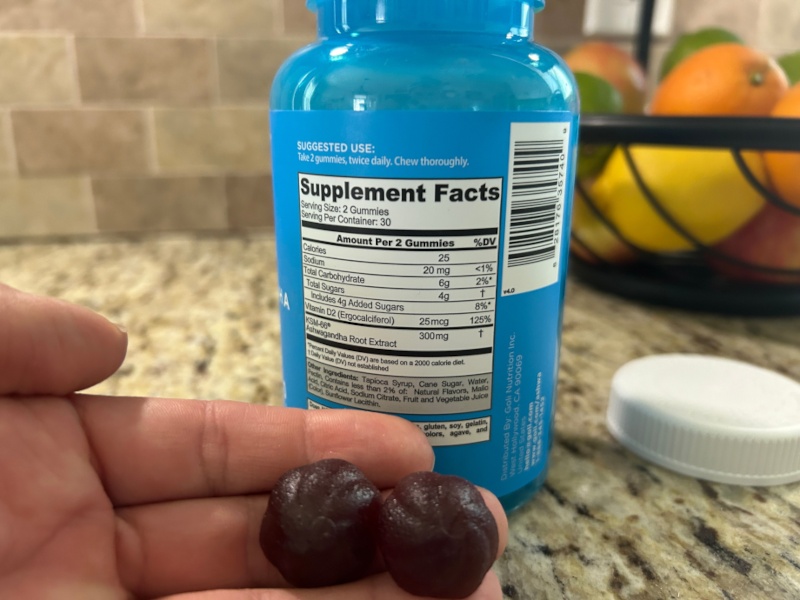
I’m a certified nutrition coach, but I’m no expert in supplement formulation. That’s why we asked Sydney to provide detailed feedback on the formulation of every product we tested. This helped us narrow down our list and choose options that use high-quality ingredients at the right doses.
Taste and Swallowability
Ashwagandha root powder can have a mild, earthy smell and taste. It’s generally tolerable, but certain supplements can have a bit of taste or smell that may bother some users.
While none of the products we tested had a particularly unpleasant taste, we made sure to choose products that were as close to flavorless as possible. For the gummies, we chose the ones with the highest flavor score.
Side Effects of Ashwagandha
Since ashwagandha is a plant extract, some people have unpleasant side effects from supplementation. None of our testers experienced any negative effects, but digestive issues like nausea, diarrhea, upset stomach, and vomiting may occur, particularly with high doses.
Even though it doesn’t usually cause sedation the way supplements like melatonin can, ashwagandha may also cause drowsiness and fatigue.
As a reminder, you should always consult with your physician before taking any supplement, especially ashwagandha. Those who are pregnant, breastfeeding, currently on prescription medications, or those with autoimmune disorders should be particularly careful, as ashwagandha may be unsafe.
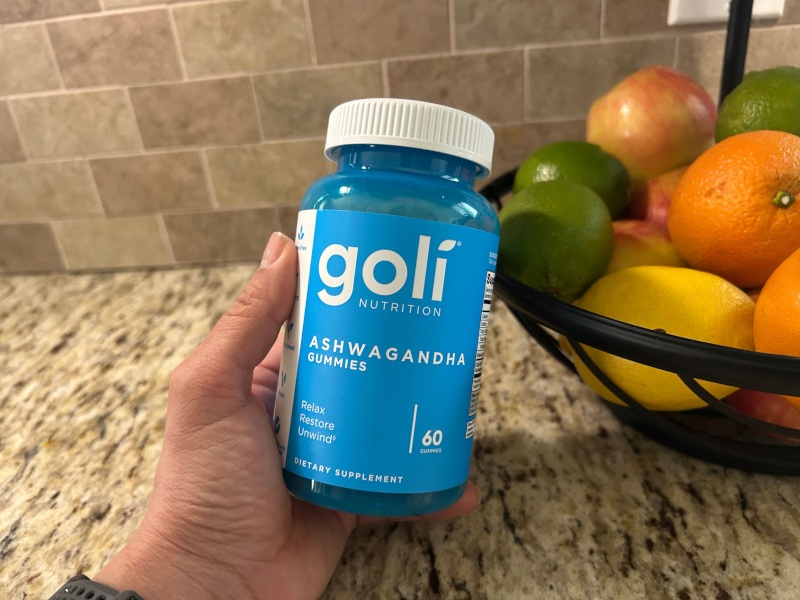
RELATED: What You Need to Know About Melatonin and Sleep
What to Consider When Buying Ashwagandha Supplements
Even though ashwagandha is growing in popularity, especially for those who struggle with sleep, it’s important to understand how it works, the benefits of ashwagandha, and who it’s a good fit for. It may not be the best fit for everyone, so let’s review the important points to consider before purchasing anything.
How Ashwagandha Works
Ashwagandha is an herbal supplement that’s best known for its anti-inflammatory, anti-anxiety, and antioxidant properties. Its name is Withania somnifera, and it’s been used as a staple in Ayurvedic medicine for thousands of years, often referred to as “Indian ginseng.”
It’s often classified as an adaptogen, a substance that can help the body manage periods of high stress by reducing cortisol levels, improving energy and physical performance, supporting cognitive function, and promoting relaxation. It may also improve blood sugar levels and increase thyroid hormone, which is why you need to speak with a doctor before using it.
Although it’s not typically used as a sleep aid, research has shown that it may indeed improve sleep quality, and it’s often used as a natural sleep remedy.
A 2021 meta-analysis that summarized five randomized controlled trials showed that ashwagandha may have a small yet significant impact on sleep compared to a placebo, particularly in adults who struggle with insomnia and use this supplement for at least eight weeks. (2)
Another 2022 study looked at college students who regularly used ashwagandha for at least 30 days, and the students reported improved well-being, particularly through improved energy levels, mental clarity, and enhanced sleep quality. (3)
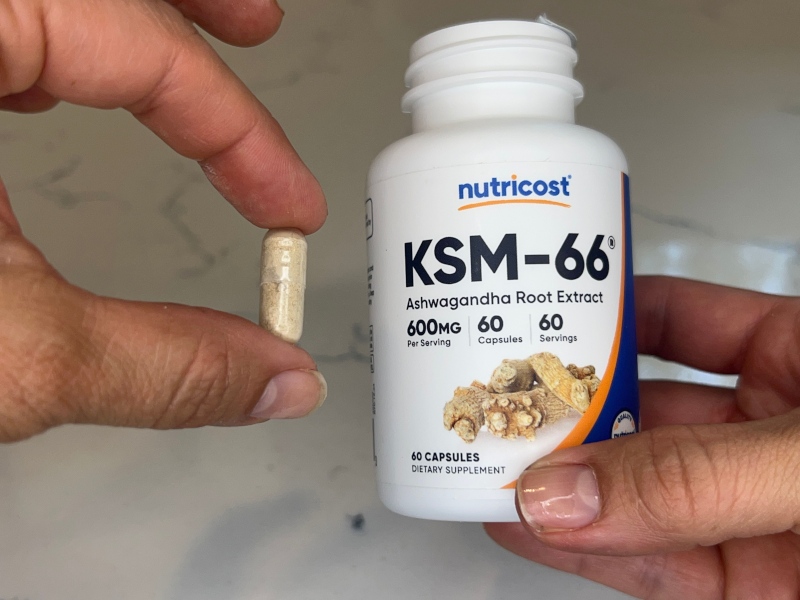
RELATED: Ashwagandha and Sleep
How to Choose the Best Ashwagandha Supplements
When choosing any type of supplement, one of the first things you should be looking for is third-party testing. This ensures the product is free of banned ingredients, and contains what’s actually on the label.
If you can’t find third-party testing, supplements manufactured in GMP facilities tend to have the best manufacturing standards and will generally make this very obvious on the supplement packaging.
Once you’ve found a high-quality supplement, you should consider the dosing. Your individual tolerance may vary, but most research uses a dose between 250-600 mg per day. (2)
Some users report that it causes a stimulant effect and gives them energy, so you’ll want to experiment with the timing and take it early in the day at first. If you find that it gives you more energy, it won’t be a good sleep aid.
RELATED: The Best Sleep Aids
Who Should Take Ashwagandha
As with all supplements, you should always consult with your doctor to discuss the safety of ashwagandha before ordering a bottle. If your healthcare professional has cleared you, this is a great supplement to consider for anyone struggling with insomnia, especially if it seems to be stress and anxiety-related.
It’s also a good fit for those going through stressful periods of life, as it’s an adaptogen that can help the body manage stress. However, there’s not much data on long-term safety, so while it may help, it’s not something that you should take every day for months on end without speaking to your doctor.
Who Should Not Take Ashwagandha
Since ashwagandha can aggravate certain health conditions, individuals who are pregnant, breastfeeding, taking prescription medications, or living with an autoimmune condition should probably avoid ashwagandha. It may also increase thyroid hormone levels, so anyone with hyperthyroidism may need to avoid using this supplement.
You should also do some individual testing if you want to try this supplement. Some users report that it gives them a burst of energy, so if you plan to use this as a sleep aid, you should make sure it has a calming effect, rather than a stimulating effect.
FAQs
What form of ashwagandha is most effective?
There are many forms of ashwagandha supplements, and KSM-66 is generally considered to be one of the best forms to use.
What happens when you take ashwagandha daily?
When used on a daily basis, ashwagandha acts as an adaptogen. It helps the body manage periods of high stress by supporting a healthy immune system and reducing anxiety, and it acts as a powerful antioxidant. It’s also been shown to have potential sleep benefits and may improve cognition and mental focus.
What are the side effects of taking ashwagandha?
Ashwagandha, particularly in high doses, can cause upset stomach, diarrhea, nausea, or vomiting. It can also interfere with certain medications and may worsen autoimmune conditions.
You should always speak with your healthcare provider before taking any type of supplement, especially ashwagandha.
Sources
- Lopresti, A. L., Smith, S. J., Malvi, H., & Kodgule, R. (2019). An investigation into the stress-relieving and pharmacological actions of an ashwagandha (Withania somnifera) extract: A randomized, double-blind, placebo-controlled study. Medicine, 98(37), e17186. https://doi.org/10.1097/MD.0000000000017186
- Cheah, K. L., Norhayati, M. N., Husniati Yaacob, L., & Abdul Rahman, R. (2021). Effect of Ashwagandha (Withania somnifera) extract on sleep: A systematic review and meta-analysis. PloS one, 16(9), e0257843. https://doi.org/10.1371/journal.pone.0257843
- Baker, C., Kirby, J. B., O’Connor, J., Lindsay, K. G., Hutchins, A., & Harris, M. (2022). The Perceived Impact of Ashwagandha on Stress, Sleep Quality, Energy, and Mental Clarity for College Students: Qualitative Analysis of a Double-Blind Randomized Control Trial. Journal of medicinal food, 25(12), 1095–1101. https://doi.org/10.1089/jmf.2022.0042
































